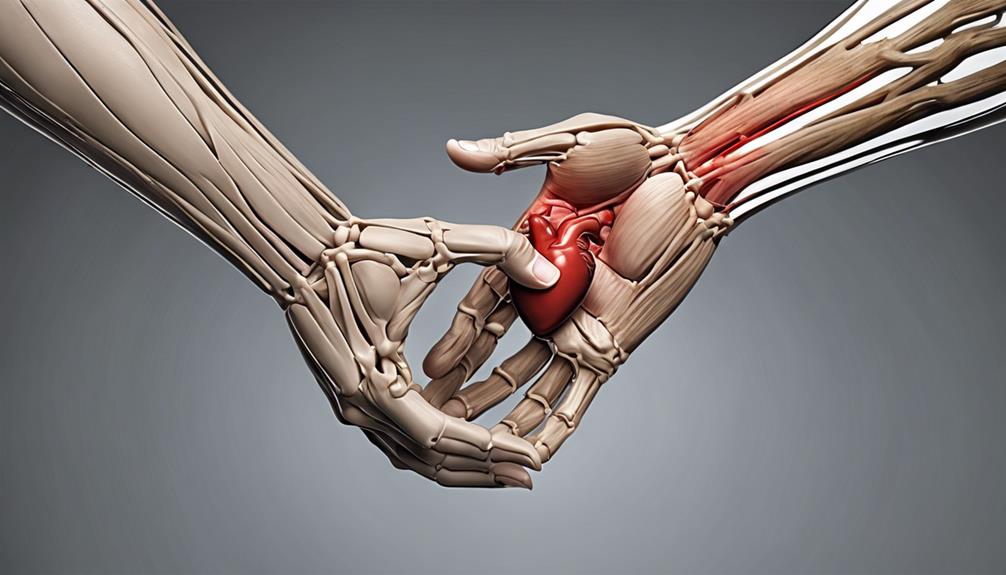Have you ever thought about the possible link between Carpal Tunnel Syndrome and heart disease?
Recent studies have hinted at a possible relationship between the two conditions, raising intriguing questions about their underlying mechanisms.
As we explore this fascinating intersection further, we may uncover valuable insights that could revolutionize our understanding of these health concerns and pave the way for improved interventions.
Key Takeaways
- Carpal Tunnel Syndrome linked to increased heart failure risk.
- Early detection crucial for identifying heart disease risk.
- Shared symptoms include pain, numbness, and weakness.
- Regular exercise and heart-healthy diet help prevent both conditions.
The Link Between Carpal Tunnel and Heart Disease
Have you ever thought about the possible link between Carpal Tunnel Syndrome and heart disease? Research indicates a significant association between Carpal Tunnel Syndrome and heart failure, especially among older adults. Studies have shown that individuals with Carpal Tunnel Syndrome face a 39% increased risk of developing heart failure within a decade. Furthermore, there's a higher incidence of amyloidosis, a rare heart disease, in patients with Carpal Tunnel Syndrome. The hazard ratio for heart failure in those with Carpal Tunnel Syndrome stands at 1.39, emphasizing the notable link between the two conditions.
Early diagnosis of Carpal Tunnel Syndrome could potentially serve as an indicator for monitoring heart failure risk. This suggests the importance of regular monitoring and timely intervention for individuals with Carpal Tunnel Syndrome to address potential heart health issues. Understanding this connection between Carpal Tunnel Syndrome and heart disease underscores the significance of holistic healthcare practices that consider the interrelated nature of various medical conditions.
Risk Factors for Carpal Tunnel and Heart Health

Exploring the shared risk factors between Carpal Tunnel Syndrome and heart health reveals crucial insights into the potential interplay of these conditions. Several studies have demonstrated a significant association between Carpal Tunnel Syndrome and Heart Failure, indicating a higher risk for individuals with the former to develop the latter. Patients with carpal tunnel syndrome aged 61-70 and over 70 face a 48% increased risk of heart failure within a decade. The hazard ratio for heart failure in individuals with carpal tunnel syndrome is 1.39, further emphasizing this correlation. Moreover, Carpal Tunnel Syndrome is linked to a 79% higher risk of developing amyloidosis, a condition associated with heart disease. Early detection of Carpal Tunnel Syndrome can serve as a valuable tool in identifying individuals at risk for heart failure, enabling timely interventions. This highlights the importance of further research into the connection between Carpal Tunnel Syndrome and heart health to enhance early detection and intervention strategies.
| Risk Factors | Heart Health |
|---|---|
| Age 61-70 and over 70 | 48% increased risk of heart failure |
| Hazard Ratio for heart failure | 1.39 |
| Carpal Tunnel Syndrome and amyloidosis | 79% higher risk |
| Early detection of Carpal Tunnel Syndrome | Enables timely interventions |
| Research needed | To enhance early detection and intervention strategies |
Symptoms Shared by Carpal Tunnel and Heart Disease
Symptoms common to both Carpal Tunnel Syndrome and heart disease include pain, numbness, tingling, weakness, swelling, discomfort, reduced grip strength, difficulty in fine motor tasks, hand clumsiness, and decreased sensation in the hands and wrists. It's crucial for patients experiencing these symptoms to seek medical attention promptly to receive an accurate diagnosis and appropriate treatment.
Here are some key points to consider:
- Both Carpal Tunnel Syndrome and heart disease can manifest with pain, numbness, and tingling in the hands and wrists.
- Weakness in the affected areas may be experienced by individuals with either condition.
- Swelling and discomfort in the hands and wrists are common symptoms in both Carpal Tunnel Syndrome and heart disease.
- Reduced grip strength and challenges in performing fine motor tasks can be prevalent in patients with these conditions.
- Hand clumsiness and decreased sensation may be shared symptoms between Carpal Tunnel Syndrome and heart disease.
Understanding these shared symptoms can aid in early detection and management of these health issues.
Diagnosis and Treatment Options

What are the most effective diagnosis and treatment options for carpal tunnel syndrome and its potential link to heart failure? When it comes to diagnosing carpal tunnel syndrome and its association with heart failure, early detection plays a crucial role in improving the prognosis and treatment outcomes for patients. For diagnosis, nerve conduction studies and electromyography can help confirm carpal tunnel syndrome, while assessing heart failure risk may involve cardiovascular evaluations and monitoring. Treatment options for carpal tunnel syndrome range from conservative approaches like wrist splinting and physical therapy to more invasive measures such as corticosteroid injections or surgery. In the case of heart failure, treatment may include medication, lifestyle modifications, or surgical interventions depending on the severity of the condition. By promptly identifying and addressing carpal tunnel syndrome, healthcare providers can potentially mitigate the risk of heart failure in patients with this condition.
| Diagnosis | Treatment | Patients |
|---|---|---|
| Nerve conduction studies | Wrist splinting | Early detection |
| Electromyography | Physical therapy | Better prognosis |
| Cardiovascular evaluations | Corticosteroid injections | Improved outcomes |
Prevention Strategies for Both Conditions
To prevent both carpal tunnel syndrome and heart disease, implementing proactive measures such as regular hand and wrist exercises and maintaining a heart-healthy diet is essential. Engaging in wrist stretches and hand strengthening exercises can help prevent carpal tunnel syndrome, while maintaining a healthy weight and avoiding repetitive hand movements are crucial factors in reducing the risk of developing this condition.
Monitoring blood pressure and cholesterol levels regularly is key in preventing heart disease, as these are significant risk factors for heart issues. Following a heart-healthy diet that includes fruits, vegetables, whole grains, and lean proteins supports cardiovascular health and reduces the risk of heart disease.
Additionally, staying physically active with exercises like walking, jogging, or swimming can improve heart function and lower the chances of developing heart disease. By incorporating these strategies into daily routines, individuals can take proactive steps towards preventing both carpal tunnel syndrome and heart disease.
Frequently Asked Questions
What Does Carpal Tunnel Have to Do With Heart Problems?
We know that carpal tunnel syndrome and heart problems are linked. The research reveals an increased risk of heart failure diagnosis within 10 years for those with carpal tunnel syndrome.
This condition can indicate underlying heart issues like transthyretin amyloid cardiomyopathy. Older age groups, especially those over 61, show a higher risk of heart failure with carpal tunnel syndrome.
The association between carpal tunnel syndrome and heart problems is significant for both men and women.
What Disease Is Related to Carpal Tunnel Syndrome?
Carpal Tunnel Syndrome can be linked to various health conditions, with one notable relationship being a rare form of heart disease known as transthyretin amyloidosis. Understanding these connections is crucial for early detection and intervention.
How Do I Know if I Have Carpal Tunnel Amyloidosis?
If we suspect carpal tunnel amyloidosis, we should seek medical evaluation. Symptoms like hand weakness, numbness, tingling, and pain can be indicative.
Diagnosis typically involves blood tests, imaging studies, and occasionally a biopsy. Early detection is crucial to prevent severe heart disease.
Consulting a healthcare professional for a thorough evaluation is recommended to confirm the condition and explore treatment options.
Can Heart Problems Cause Pain in Hands?
Absolutely, heart problems can indeed cause pain in the hands. Reduced blood flow and nerve issues stemming from heart conditions like heart failure or coronary artery disease can manifest as hand pain, numbness, or tingling. Such symptoms might also be accompanied by chest pain, shortness of breath, fatigue, or dizziness.
If you experience hand pain related to heart issues, seeking immediate medical attention is crucial to address the underlying cardiac condition.
Conclusion
In conclusion, the connection between Carpal Tunnel Syndrome and heart disease is a critical reminder of the importance of early detection and management of both conditions.
While some may question the link between these seemingly unrelated issues, it's essential to recognize the potential impact on overall health and well-being.
By addressing risk factors, symptoms, and treatment options for both Carpal Tunnel Syndrome and heart disease, individuals can take proactive steps towards better health outcomes.









